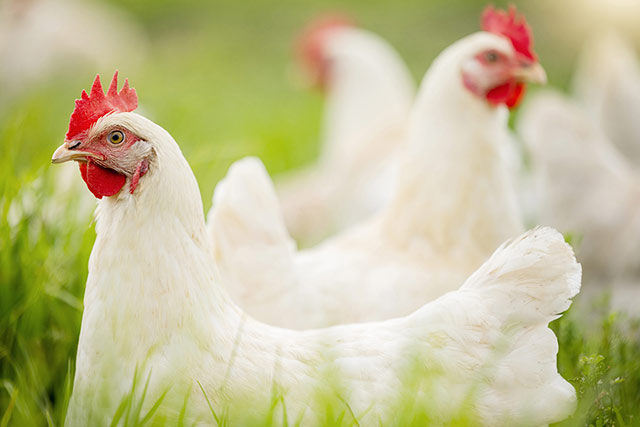In the realm of poultry feed, Active dry yeast stands as a probiotic powerhouse, sanctioned by both the US FDA and China’s Ministry of Agriculture and Rural Affairs. This natural additive is unique in its ability to avoid the tolerance trap that animals often develop with other substances. As part of a growing international research effort, Angel Yeast has embarked on a journey to understand how Active dry yeast - YeaVita can enhance the production performance of broilers and laying hens. Our latest findings, presented in this paper, aim to bolster the theoretical framework for YeaVita’s application in poultry farming. Let’s dive into the results of our research and see what YeaVita can do for your flock.

Effect of YeaVita on broiler growth performance
1000 one-day-old Lingnan yellow-feathered broilers were selected and randomly divided into 5 groups, with 4 replicates in each group, 50 birds per replicate (half male and half female). The test period was 49 days. The control group was fed a basic diet. The test group contained 0.5×107, 1×107, 2×107, and 4×107 cfu of living yeast per gram of diet respectively, equivalent to 250, 500, 1000, and 2000g of YeaVita with a living count of 2×1010cfu/g were added to each ton of complete feed. The test results are shown in the figure below.
At 0-4 weeks of age, the ADFI (average daily feed intake) of the 4×107cfu/g group was consistent with that of the control group, and the average daily weight gain was significantly higher than that of the control group (P<0.05), The control group had the highest FCR (Feed Conversion Ratio) (P>0.05).
At 4-7 weeks of age, the ADFI of the 0.5×107cfu/g group was consistent with that of the control group, while the ADFI and FCR of the other experimental groups were lower than those of the control group (P>0.05); the ADG (Average daily gain) was higher than that of the control group (P>0.05).
At 0-7 weeks of age, each group adding YeaVita showed a tendency to improve the growth performance of broilers, mainly as follows: ① The feed consumption during the whole period was lower than that of the control group; ② The ADG was higher than that of the 1×107cfu/g group except for the control group, which was slightly lower (-0.07g/d), the other groups were all higher than the control group; ③ The FCR of each experimental group was lower than that of the control group.
At 0-7 weeks of age, the mortality rate in each experimental group was lower than that in the control group (P>0.05).

Effect of YeaVita on laying hens production performance
Test 1
192 31-week-old Hailan brown laying hens were selected and randomly divided into 2 groups, with 12 replicates in each group, and 8 laying hens in each replicate. The test period was 14 days. Control group A was fed with basic diet, and test group B was fed a basal diet of +200g/t YeaVita. The test results are shown in the figure below.
In the first week of the experiment (32 weeks), the average egg weight, feed-egg ratio, and qualified egg rate of laying hens in group B were close to those of control group A, and the cumulative egg production of each hen was lower than that of control group A. However, in the second week of the experiment (33 weeks), the average egg weight of laying hens in group B was 1.05g higher than that of control group A, the feed-egg ratio was reduced by 0.08, the qualified egg rate was increased by 0.8%, and the cumulative egg production of each hen was 7.28g/week.


Test 2
324 Sanhuang breeders at the age of 24 were selected and randomly divided into 2 groups with 3 replicates in each group, with 54 laying hens per replicate, and the test period was 49 days. Control group A was fed with a basic diet, and test group B was fed with a basic diet +1.0 kg/t YeaVita. The test results are shown in the table below.
Compared with the control group, the laying rate and qualified egg rate of the experimental groups were increased by 3.57% and 2.57%, respectively, and the average egg weight was increased by 1.44g per piece.

Conclusion
In our quest to enhance poultry performance, we’ve discovered that enriching broiler diets with 0.25-2kg/t of YeaVita from Angel Yeast can lead to significant improvements. Notably, it boosts Average Daily Gain (ADG), moderates Average Daily Feed Intake (ADFI), and optimizes Feed Conversion Ratio (FCR). Similarly, integrating 200g/t or 1kg/t of YeaVita into the diets of laying hens has been shown to up the ante on laying rates, qualified egg rates, and average egg weight, all while reducing FCR and enhancing the overall well-being of the hens.
As we conclude our research, these compelling results underscore the potential of YeaVita to revolutionize poultry farming. Stay tuned for more as we continue to explore the depths of YeaVita’s impact on the poultry industry.
| Published by Aolin Wu Assistant Engineer of Animal Nutrition Division |
About Angel Animal Nutrition:
Fubon is a brand of Angel Animal Nutrition. Fubon is committed to developing natural, efficient microbial feed derived from yeast with Angel's leading technology in yeast industry, providing the best service solutions for the nutrition and health in animals. Angel Animal Nutrition creates value for global feed and animal agriculture customers through continuously upgraded products and professional services.
About Angel:
Angel Yeast Company is a high-tech listed company specializing in yeast and biotech. Product business covers Yeast and Baking, Yeast Extract-Savoury, Nutrition & Health and Biotechnology fields. It is one of the world's leading companies in the yeast industry. Angel has 12 holding subsidiaries and provides products and services for more than 150 countries and regions.
Press Contact:
ANGEL YEAST CO.,LTD
Address: 168 Chengdong Avenue, Yichang, Hubei 443003, P. R.China
Tel:+86-717-6369520, 6369558
Fax:+86-717-6370680
email: wual@angelyeast.com








